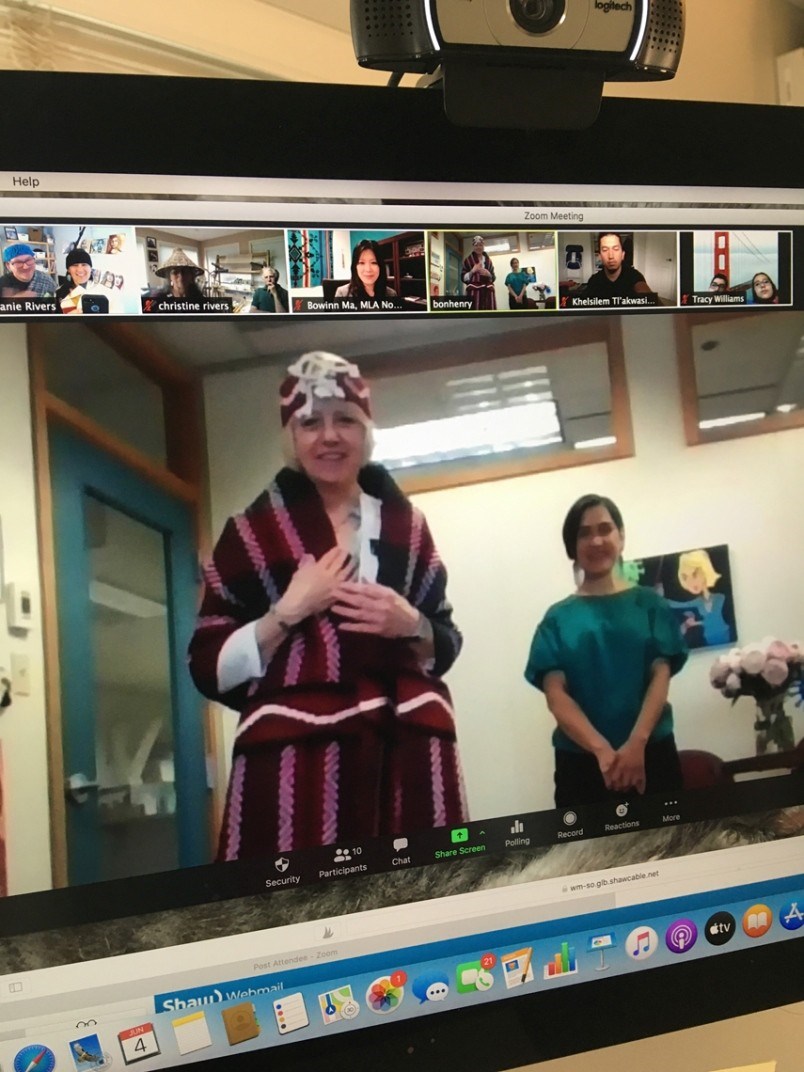The woman leading B.C.'s fight to stop the spread of a pandemic may be feeling the love this week after a Squamish Nation family found a way to show their gratitude using both traditional and very modern methods.
The Rivers family met with B.C.'s provincial health officer Dr. Bonnie Henry online on June 4 to honour her with an EsŽmkwu, or blanketing ceremony.
"It's physically wrapping a blanket around her shoulders, but it represents our love and support for her. It's to give her strength and to help her if she's feeling like she needs some support," said Melanie Rivers, whose ancestral name is Tiyaltelwet.
The Rivers family weren't sure if it would even be possible, given Henry's schedule and rules for physical distancing. But North Vancouver-Lonsdale NDP MLA Bowinn Ma set up the meeting and acted as an outside witness. Dr. Dani�le Behn Smith, aboriginal health physician advisor, stepped in to wrap Henry in the blanket on behalf of the Rivers family, who drummed and sang.
The shawl they gave to Henry was hand woven by Rivers’ mother Christine. Although she is of Scottish/Canadian descent, when she married into the Rivers family, she received the name Luskwalwun. It features images of water, a heart and a house, representing calm, kindness and safety (or staying home), respectively. Together, they reference Henry's mantra: Be Calm. Be Kind. Be Safe.
"It certainly helps me remain calm during this time," Rivers said.
Rivers' husband Aaron Nelson Moody, Tawx'sin Yexwulla, spoke on behalf of the family during the Zoom meeting. Because of the constraints of doing the ceremony via Zoom and because of Henry's onerous schedule, they shortened the ceremony to 20 minutes. Typically, a feast is held after a EsŽmkwu, but that too would require some COVID-era improvisation.
"We heard through one of her interviews that she likes chocolate, so we sent a box of chocolates," Rivers said.
During the brief chance they had to chat, Henry recognized Rivers from their professional history together. Rivers spent 15 years working in public health at the B.C. Centre for Disease Control.
Henry was grateful for the honour, Rivers said, but also spoke with her noted compassion.
"She's humble. She spoke a lot about how she was concerned about Indigenous people in this pandemic and how our people have not fared well in pandemics in the past," Rivers said. "She's an ally to Indigenous people. She's shown understanding and respect towards our people and we wanted that to be acknowledged as well, and thank her for that."
Ma said it was a beautiful ceremony that she was honoured to be asked to be the official witness.
"It was obvious from the way Dr. Bonnie Henry responded to the ceremony and to the words that were spoken that she was very moved as well," she said.
Afterwards, Rivers family members posted images from the ceremony online. They included the hashtag #ThankAuntieBonnie, inviting others to show their appreciation and support.
"We had other people message me to say they were moved to tears seeing that she was being thanked. I think people are wanting to thank her and maybe not knowing how or having that opportunity," Rivers said.
To read the original story go here.




